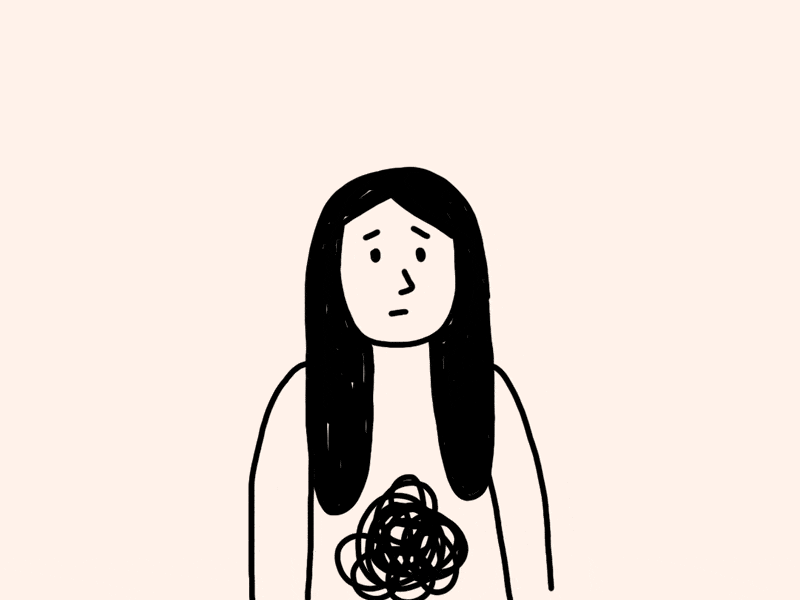In contrary to this, and with all respect Doc, that’s only half the jazz. Through my eyes there exists no singular definition.
Anxiety is the fear of repeating a specific event that still taunts one’s memory. Anxiety is the act of overthinking. Anxiety, for some, is a brew of multiple factors that disrupt their mental wellness.
Table of Contents
My Own Beginnings
Before I get down to business I must I was tell you this. I was always social. Ever since I was in elementary school I was buzzing around the blacktop (or playground as others might call it, but at my campus we called it just so), running around wild and, on some occasions, even coming home with holes in my school uniform because I played so rough.
I liked to run. I liked to sweat. I had more guy friends than girl friends—and even these ‘’girl friends’’ I had were sweating and running and playing tetherball (very seriously) just like me. Some would even refer to all this as possible ‘’Tomboy behavior.’’ But for all I cared I just saw it all as being a kid.
In due of the natural process of aging it wasn’t long before I used up more than half of my seventeen-year trial of life. That is, the trial before life itselfactually begins—the real test.
During this time I was going on thirteen, fourteen. And like most girls my age I was also going through some of those same old scenarios people tend to share with more forgiveness, and with less shame, by the time they receive their first letter from AARP.
I straightened my curly hair, fell victim to the flat iron, and finally learned to appreciate my curls again by high school after someone wrote in my yearbook ‘’You really damaged your hair!’’ followed by a chicken scratch looking smiley face. I made friends and lost friends.
I liked some boys—but for some reason was never interested in actually dating like some of the other girls. In fact, on the day my best friend (let’s call her Rebecca) said she was learning Spanish because her new boyfriend’s family was of Mexican decent I just shook my head, twice, and carried on my business. And you know what, all Rebecca did was hold her flashcards even tighter. They parted ways no less than two weeks later.
I went to sleepovers and quickly learned that even though I was always the first person to go to sleep, and the first person to wake up, I also had no hesitation to turn on the stereo to the loudest frequency possible to let everyone know the sun was out and about, and so was I.
I was quiet but during many instances an extrovert. I liked to read but also didn’t mind going out
I liked socializing but preferred being alone to myself. As time went on I also realized that I liked having conversations with older people more than people my own age. This still remains true.
I grew up as an only child. We went to family reunions once in a while, where I met many individuals my age, but for the most part, I was highly used to being around adults—hearing adult things and
Accepting your body is never an easy feat!
It wasn’t for me…
The Incidents
In short, during my sophomore year of high school I was bullied. There were two ongoing scenarios in two different classes with two completely different sets of people, who taunted me for entirely different reasons.
Things were said about my appearance. Apparently I looked ‘’ugly’’ to the guys and a few of them wanted to let me know. At some point three students went around the room and rated the girls.
This was based on how ‘’attractive we looked.’’ I got a 2 out of 10. That bothered me. But why? All I know is that back then, and like many around that age, it just mattered. So I tried doing something about it, and to my surprise the commentary flipped.
Apparently looking more put together meant that I was ‘’trying too hard.’’ This terribly conflicted me. It was like a Ping-Pong ball bouncing around in my head. So it was relevant that I was both ‘’ugly’’ and ‘’trying to not look ugly?’’
From this, and after being told that my entire schedule would be altered if I had switched even just one period with another, I decided to put up with it in due of a blanketed fear that the ill laced judgment would repeat again—regardless of location.
Unsurprisingly, as a result of being exposed to this flawed mindset, and hearing these people and their snickers every other day, I grew depressed. I didn’t smile as often. I didn’t eat as often.
When I got anxious I would sometimes scratch my thumb. This lead to a noticeable scab that I once told a concerned friend was an injury I got from cooking the other day. After she let off my shoulders I realized I was a pretty good actor too. Aside from her I was lying to everyone. Telling them I was fine.
Eventually the words in my head developed into awful philosophies and ponderings. Most of which, now, are nothing but a strange mist that came and left. But the ones I truly remember went along the lines of ‘’Why am I here?’’and ‘’Do I have worth?’’and even ‘’Why am I still here?’’
Yes, for a period of time I had thoughts of suicide. But deep down I knew that I would never have the guts to actually do it. The after life, not afterlife, is a concept that rattled me even more than the physical world.
The Downfall
A month passed and the idea of going into a classroom, and being surrounded by people, terrified me. I was missing more days of school, so much to an extent that the vice principal held a meeting with my parents to discuss my increased absence.
Apparently, if I dared to miss three more days I would be held back. I didn’t want this. Despite everything going on I still cared about my education. So it wasn’t long before I resorted to getting diagnosed by my physician, as it was suggested, so that the school could at least be a little more flexible with my case. I was still turning work in and earning good grades. It was just the fact that I was not always present.
On the days I actually went in, my body clock would wake up at 3 AM—sometimes even earlier—and refused to let me fall back asleep. This was my anxiety.
Lying there in bed, while waiting for daylight to come, and replaying ‘’scenes’’ from previous days over and over again in my head. The best way I can describe it would be like having your own mental VCR, where you can rewind and pause or even fast-
Here I was analyzing what I did ‘’wrong’’ or what I ‘’could have said or done differently to make the frame perfect next time.’’Of course, life does not work that way.
As for my bullies, and after my parents urged me to report their behavior to the school counselor, most of them were called in and spoken to as well. Most let off. Others settled down for a while but started back up after another month or two passed.
This was especially the case for one individual who intentionally threw a damp ball of paper at my head, hard, one day. I told this person to stop, and the next thing I knew those nasty words came flying right out of their mouth. ‘’What are you gonna do about it n*****?’’
I was stunned. Everything happened so fast, but I mostly remember a number of students sitting there with big eyes. Some were even making a large ‘’O’’ shape with their mouth out of shock or, in other cases, undeniable amusement.
Fortunately, our teacher overheard the commotion and further called campus security to escort heads out. I was later told that the person faced temporary expulsion for up to two weeks. That little surprise at the end was the sprinkle on top.
The Critic
I became my worst critic. Yes, after that incident the exterior forces that belittled me were finally quiet. But things weren’t so much the same in my head.
Those previously mentioned philosophies were still present. It was so much to an extent that in some ways (after a few months time) I gradually stopped taking care of myself.
I was still losing weight. I started showing up to school in dark sweatpants and oversized jackets (which was completely out of my character, as I sought to suppress any form of creative expression). I stopped caring about washing my face and applying makeup, taking care of my hair.
On some days, usually the weekends, instead of going out I would stay in bed for an extra to 4-5 hours straight. No, I’m not kidding. I distinctly remember there being times where I would pull off the blankets and seeing it was dark out. On various accounts I also refused dinner.
I had subconsciously put my own brakes on. When I did happen to feel content, which was usually out in town, I would eventually feel afraid of being happy again in fear of another bad event.As a result, and in hopes to avoid this, I began craving to always feel down.
I finally sought therapy after another student, someone I hardly knew personally but sat near my desk, asked if I was ‘’OK.’’ My body felt hot, but I didn’t realize that she could actually see my watery eyes that morning. Had anything previously happened that day? No. It was all interior. It was a cocktail mix of emotions.
Why I didn’t seek therapy earlier was rather simple. I despised the idea, and this conclusion was based on previously overheard stereotypes on the whole ordeal.‘’There’s something wrong with you,’’ or ‘’You’re crazy,’’ are a few examples. I didn’t realize how unjust these statements were.
The Therapists
The first therapist, for the sake of privacy, was named Dr. Hayworth. I only saw her once.
She introduced herself and her credentials, and it wasn’t long before I was the one doing all the talking. I shared my story—at least very corner and cranny that I found reasonable for her to know.
Once my mouth shut she just stared at me. That’s the one thing that really struck me. Just her looking at me like that after I was done. Next thing that comes out of her mouth had my blood pressure going up. ‘’Do you believe in God?’’ she says. I nod my head. Reasonably satisfied, she continued.
”Well, don’t you know it’s a sin for you to think that way?’’ The next few minutes consisted of her telling me that my attitude towards life was a disgrace to God, and that if my appointment was scheduled earlier in the day (I was in her office in the late evening) she would have admitted me to the nearest rehabilitation facility. It was also noted that God was using my bullies as ‘’punishment’’ for my lack of effort to get better.
I felt offended. Yes, I needed someone outside of my inner circle, a stranger who might as well be a professional, to set me straight. But this woman was downright shaming me for how I felt and using religion as her reason for dictation.
You can bet that immediately after our session I went straight to the front desk and explained why I wouldn’t be coming back. The receptionist, in short, was most shocked and didn’t mind suggesting a few other locations. Isn’t that something? She didn’t refer me to another therapist in the building but somewhere else.
The second therapist, for the sake of privacy, was named Dr. Star. She was located in a different part of town and I saw her more than once.
Dr. Star was a good therapist, but even if she weren’t professionally I’d say she was a remarkable listener and host. We discussed anxiety, depression. We talked about my problems.
We corrected each other when necessary. We even played some Golden Globe version of charades where one of us would pick up a card, act out the dialogue, and have the other guess what emotion it was.
I found this to be really fun. We even laughed a few times. But it was after my fifth visit when I realized she had already given me everything she could.
Sure, our sessions were satisfying and educational. It was great to vent. I even recall feeling more like myself after the very first visit. It was just, there came a moment when I realized Dr. Star did not have the capability to correct my state of mental wellness. And so I told myself right then and there that the only person who could fully understand my strengths and boundaries—my story—and end up changing things was - me.
Lessons Learned
My perspective on life only changed once I started hammering in my own nails. And this does not mean waking up each morning (as your own therapist may have suggested) looking in the mirror and thinking three positive thoughts about myself. See, that didn’t work. It never did and still doesn’t. For other people it may have, but it’s just not my thing.
What worked for me was constantly challenging the voices in my head. Anxiety tells me I shouldn’t walk my dog? Well guess what? I’m still going out. Anxiety tells me those people are judging me? Come to think of it, everyone is judged. Anxiety tells me that I don’t meet up to someone’s standards? You know . . . I’ll be damned if their standards were ever high enough for me anyway.
Wrapping Things Up
To set things straight my story has yet to end. I am still here. I am growing and learning, adapting and accepting, making mistakes and carrying them in my luggage.
Ever since meeting Dr. Starr years ago I have discovered that the scientific definition of anxiety is incomplete. And my reasons for sharing my mental wellness journey is to prove just so—that anxiety isn’t just as simple as feeling ‘’nervous.’’
Anxiety is not a feeling but a conscience. Anxiety is not one’s conscience but a feeling. Anxiety is nostalgia. Anxiety is the future. Anxiety is a thief. Anxiety is the master of manipulation and can develop into weeds if left unintended. Anxiety can be faces, personalities . . .
Anxiety, to put it simple, has too many definitions. And to recap from my experiences here are a few things that I hope will further enlighten you:
- If you want to solve a problem, first admit that there’s a problem. From there find the root of your situation and ask yourself ‘’How can I make this more manageable?’’ The downside to repeating that sweet old saying ‘’Everything will be all right’’ is that life will, more often than otherwise, not be all right. That is life after all. It’s about walking on a tightrope and maintaining some form of balance, falling sometimes but getting right back up.
- When not in the right state of mind, analyze your current mindset with full honesty. Lying to yourself (and others) about your tribulations does not resolve anything. In fact, all you’re doing is pushing dirt under a rug that should have already been swept.
- Understand that you are your worst critic. Evidently I learned this the hard way. You need to recognize that the scenarios we face end up the way they do because of the decision(s) we make. Again, it’s all about perspective. Don’t look at how big the mountain is. Imagine yourself already at the top.
- Understand that you are your own helping hand. If you constantly avoid social activities because your anxiety is saying you can’t do it, don’t expect someone to burst through the door and pick you up. Yes, friends and family and therapists and trusted strangers can be our biggest motivators. But at the end of the day you need to learn how to do your own walking. Until then your time for change won’t come.
- If you feel judged by your therapist or aren’t satisfied with the session, find another therapist. I can’t stress this enough. Establishing a trusting relationship is vital for the success of both individuals.
- Know that the ”pill” isn’t always the answer. Another red flag that hints your therapist doesn’t see you as you is something I’ve gathered from both my own experiences and a few friends. If medication is pushed before actual counseling, understand your therapist is not seeing you as a person in need but instead a moneymaking opportunity.
Conclusion: Appreciate the Little Things
It’s a plain simple fact that all things living will eventually return to the earth. But it wasn’t until my grandmother passed away in late 2017 that I fully heard sayings such as ‘’Life is a blessing’’ and ‘’Make the most of moments.’’
During this time I felt like wanting to go back in time and do one more thing. Give her one last hug, have one more meal together, have one more big laugh, or ask her one more question about her life, mine. Do you see the pattern here? These longings are far too common. Most of us have the opportunity to do these things with someone everyday.
Ironically the most important question I forgot to ask all those years was also too easy. What did you learn? If I could answer for her, I’d say it would be this advice right here.
Life isn’t too short. It’s very short. Continue thriving for your family. Continue unapologetically living for you. If you’re currently dealing with anxiety or depression, don’t just address your state mental wellness but tackle the issue head-on.





